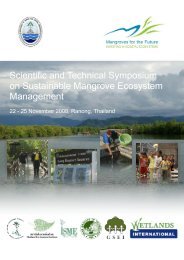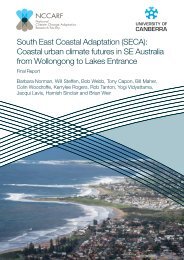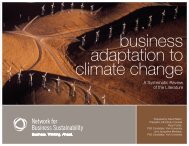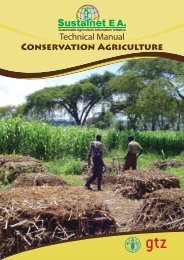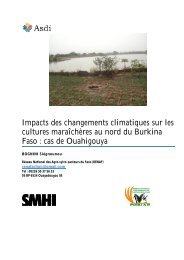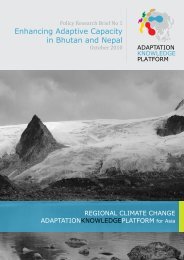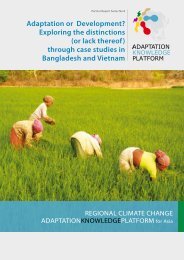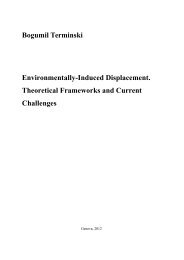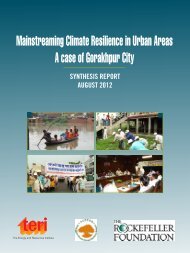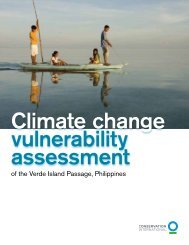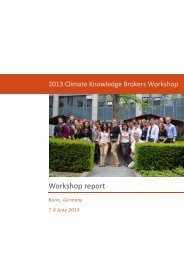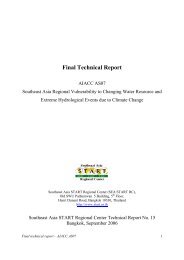Urban food security, urban resilience and climate change - weADAPT
Urban food security, urban resilience and climate change - weADAPT
Urban food security, urban resilience and climate change - weADAPT
You also want an ePaper? Increase the reach of your titles
YUMPU automatically turns print PDFs into web optimized ePapers that Google loves.
In response to the existential threats described above, there are moves to develop newapproaches to building greater <strong>resilience</strong> in cities. Many of these involve a degree ofre-localisation to reduce dependence on long <strong>and</strong> possibly vulnerable supply lines for<strong>food</strong>, energy, water, finance <strong>and</strong> waste disposal. In this context, <strong>urban</strong> agriculture hasre-emerged as a matter of public <strong>and</strong> policy debate within cities. While for some <strong>urban</strong>agriculture is a contradiction in terms, it has long been recognised by city <strong>and</strong> localgovernments <strong>and</strong> been subject to regulation. An important aspect of this research hasbeen to review studies of these regulatory regimes <strong>and</strong> to consider how these operatein practice as supporters of or barriers to the expansion of local <strong>food</strong> production <strong>and</strong>processing.The research on which this report is based involved two complementary str<strong>and</strong>s. Thefirst comprised a review of the literature: on notions of <strong>food</strong> <strong>security</strong> <strong>and</strong> relatedconcepts such as <strong>food</strong> sovereignty; on current patterns of <strong>urban</strong> agriculture <strong>and</strong> itscontribution to the consumption profile of <strong>urban</strong> populations; the impact of <strong>climate</strong><strong>change</strong> on these patterns of <strong>urban</strong> agriculture <strong>and</strong> on possible future patterns; <strong>and</strong> onbroader conceptions of <strong>urban</strong> <strong>resilience</strong> <strong>and</strong> how <strong>urban</strong> agriculture might contribute tothe strengthening of <strong>resilience</strong> in cities. The second str<strong>and</strong> involved a series ofinterviews with practitioners <strong>and</strong> policy makers in two case study cities in Australia:Melbourne <strong>and</strong> the Gold Coast. These case study areas were selected to reflectdifferent historical trajectories <strong>and</strong> patterns of <strong>urban</strong> growing. They also reflect adifferent set of opportunities <strong>and</strong> constraints on the potential for <strong>urban</strong> agriculture toplay a more prominent role in the future.The research found a variety of perspectives, conceptions <strong>and</strong> practices in both thepublished literature <strong>and</strong> in the views of our sample of practitioners. While this varietysometimes served to impede productive debate, more often it reflected sinceredifferences of opinion that could be resolved through further dialogue. Although welearnt of some instances of outright hostility to <strong>urban</strong> agriculture, it was more commonto hear of a more benign antipathy to growing <strong>food</strong> in cities. Combining a broad scaleview that Australia is a country that always has <strong>and</strong> likely always will enjoy <strong>food</strong><strong>security</strong> when seen primarily in terms of aggregate national output, with thecommonplace view that <strong>food</strong> production takes places only in rural areas, we see theroots of this apathy <strong>and</strong> complacency. Given the ways in which much debate aboutexistential threats to contemporary ways of life entails accusations of alarmism, it is notsurprising that attempts to present <strong>urban</strong> agriculture as a plausible <strong>and</strong> necessarymeasure to promote greater <strong>urban</strong> <strong>food</strong> <strong>security</strong> are met in some quarters withscepticism.The research also revealed that around the world, many cities are taking much moreseriously the various threats to their <strong>security</strong> posed by <strong>climate</strong> <strong>change</strong>, peak oil, globaleconomic instability <strong>and</strong> armed conflicts. Many are also recognising that because someof these threats are connected, so too should any effective response. Thus, while thenutritional impacts <strong>and</strong> benefits of backyard <strong>and</strong> small scale <strong>food</strong> production in citiesmay be relatively modest at present, they generate a number of other benefits,including the chance to become more aware of the provenance <strong>and</strong> quality of fresh fruit<strong>and</strong> vegetables, the opportunity to work with others in producing, processing <strong>and</strong>sharing local <strong>food</strong> <strong>and</strong> the ability to use what would otherwise be waste products thatare costly to dispose of.<strong>Urban</strong> <strong>food</strong> <strong>security</strong>, <strong>urban</strong> <strong>resilience</strong> <strong>and</strong> <strong>climate</strong> <strong>change</strong> 4



